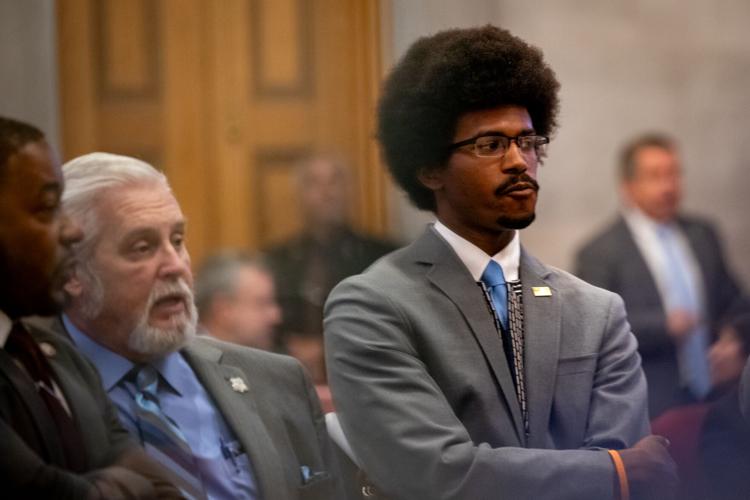Budget talks and contention over diversity, equity and inclusion policies culminated this week at the state legislature as this year’s session nears its close. Legislation on abortion restrictions and weakening the World Health Organization also advanced this week at the state Capitol.
Lamberth delays vote to run funding numbers by the White House as public opposition builds across Tennessee
The House passed the Dismantle DEI Act — sponsored by Rep. Aron Maberry (R-Clarksville) and Senate Majority Leader Jack Johnson (R-Franklin) — to prohibit local governments and public colleges and universities from using hiring practices based on an applicant’s race, religion, sex, national origin, age or disability. The bill says it also prevents “hiring a particular candidate in order to achieve any goals to increase diversity, equity, or inclusion in the workplace.”
The bill passed 73-24 on the House floor Thursday, sparking outrage among Democrats after debate was cut short by the Republican supermajority. Democrats argue the bill works to undermine equality in hiring, and several lawmakers called the bill blatantly racist.
Rep. Justin Jones (D-Nashville) proposed an amendment renaming the legislation the Dismantle Civil Rights Act, while Rep. Gloria Johnson (D-Knoxville) proposed the White Fragility Act as its new name.
“This bill is sexist,” Johnson said. “It’s racist. It’s ableist. It’s religious discrimination as well.”
Several other amendments were filed by Democrats calling out the bill for being discriminatory, but a prevailing motion from the House Republicans struck them from being introduced on the floor.
House Majority Leader William Lamberth (R-Portland) said debate was cut off because of rude comments and insults made by Democrats on the floor that were not caught by members’ microphones. Democrats called this an excuse and a way for Lamberth to shift the blame.
A similar bill also sponsored by Maberry and Jack Johnson, the Dismantling DEI Departments Act, was pushed to be considered Monday. The legislation would prohibit state departments and agencies, local governments and public institutions of higher learning from “maintaining or authorizing an office or department that promotes or requires discriminatory preferences in an effort to increase diversity, equity, or inclusion.”
“If DEI stood for ‘diversity, excellence and inclusion,’ it’d be perfectly fine,” Lamberth said at a press conference after the floor session. “But it stands for ‘diversity, equity and inclusion,’ which is communist, socialist principle that is racist at its very core. … The equity part is what is racist, and we're not going to put up with that.”
Both DEI bills are set to be heard in the Senate on April 21.
Earlier this year, both the House and Senate approved a bill that will eliminate race-based policies like affirmative action, racial preferences and racial quotas from being used when making appointments to state boards.
Deputy Whip Appointments

Rep. Lee Reeves (left) and House Majority Whip Johnny Garrett
On April 11, six lawmakers were appointed as deputy whips, a role traditionally tasked with counting votes and keeping a party’s members in line. Appointments included Reps. Renea Jones (R-Unicoi), Aron Maberry (R-Clarksville), Michele Reneau (R-Signal Mountain), Rick Scarbrough (R-Oak Ridge), Tom Stinnett (R-Friendsville) and Lee Reeves (R-Franklin)
Included in a media release were photos of each newly appointed whip alongside House Majority Whip Johnny Garrett (R-Goodlettsville), who presented each deputy whip with an actual framed black whip.
Several Democrats called foul. The Tennessee Black Caucus issued a release Wednesday saying the gifts “reflect a troubling lack of awareness and sensitivity in the General Assembly.”
“During a legislative session marked by deeply divisive bills that target and harm minority communities across Tennessee, it is essential that we as leaders demonstrate empathy, responsibility, and respect in both our words and actions,” the release reads in part.
The Tennessee State Capitol was built in part by the labor of some enslaved people.
“When legislation is introduced to dismantle programs that promote Diversity, Equity, and Inclusion — programs designed to address long-standing inequities — it reveals a troubling disregard for our shared humanity,” the Tennessee Black Caucus statement continues. “To pair this with imagery of legislators holding whips only deepens the trauma, evoking a dark and painful chapter in our state’s history.”

The Tennessee Black Caucus, April 2025
“It’s unfortunate that they’re playing politics with that,” Rep. Reeves told Scene sister publication the Nashville Post, referring to the whip photos. “There’s pictures of [former U.S. Speaker of the House] Nancy Pelosi when she was whip in the House being given [an actual whip] as well, so it’s unfortunate that they’re going to play with that. But I’m honored to have that position.”
That 2001 photo of Pelosi during her historic election as Democratic whip was also referenced by House Majority Caucus Chairman Jeremy Faison.
Taking on Debt
This year, the state is taking on new debt for the first time during Gov. Lee’s administration. Senate Majority Leader Jack Johnson (R-Franklin) introduced a bill that approved bond issuance by explaining that the Lee administration has decreased the state’s debt service over the past few years.
“We went from 2.4 percent of our total tax collections going to debt service down to 1.36 [percent],” Johnson said. “We’ve taken on no new debt, and we’ve paid a lot of it off. With this debt issuance, Mr. Speaker, we will go to 1.75 percent of our total tax collections as a percentage of our debt service needs. So we will still be well below where we were six years ago at the beginning of the Lee administration. This is a responsible use of our excellent credit rating to get some of these badly needed capital projects done for our state.”
In total, the state will have more than $1 billion in bonds: $820 million for projects approved by the State Building Commission, $134 million for state office buildings and support facilities, and $80 million for the Department of Transportation. Johnson also touted the fact that those $80 million bonds are proposed each year for transportation but are not used because the state funds road projects in the budget. He highlighted that this year $1 billion in nonrecurring funds go toward the state’s road fund.
Republicans make amendments to governor’s plan for funds — several Democrats vote against
“We don’t borrow money on our roads,” Johnson said. “We are a pay-as-you-go state, and we’re not proposing to do that.”
When asked about the money for road funding in a press conference Thursday, House Democratic Caucus Chair John Ray Clemmons (D-Nashville) said that the state has a $45 billion backlog of road infrastructure projects and should be issuing bonds to get some of that completed.
“They'll bond everything else, as you saw on the floor yesterday, but they don't want to bond transportation for some reason,” Clemmons said.
Health Care Restrictions
Gov. Lee signed a bill this week clarifying the narrow exceptions in Tennessee’s abortion ban. Under the description of “serious risk of substantial and irreversible impairment of major bodily function,” conditions can include previable/premature rupturing of membranes, inevitable abortion, severe preeclampsia, mirror syndrome associated with fetal hydrops and infection that could result in uterine rupture or loss of fertility. The legislation’s opponents say the bill is designed to absolve the state’s attorney general from a lawsuit.
A bill that would undermine the World Health Organization passed the House and moved forward in the Senate this week. HB 318/SB 263 prohibits the enforcement of requirements or mandates from not only the World Health Organization, but the United Nations and World Economic Forum. Earlier this year the governor signed a bill into law that cut the World Health Organization out of the process of responding to a pandemic.











